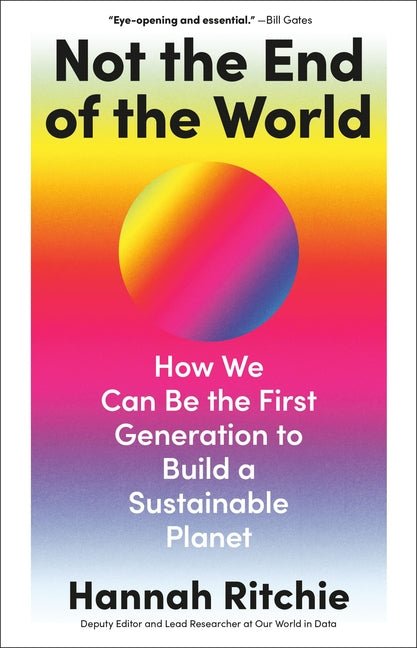Not the End of the World: How We Can Be the First Generation to Build a Sustainable Planet
by Hannah Ritchie
*When you open this audiobook on Libro.fm, be sure to select Aveson as your bookstore so that your purchase supports local literacy programs and tree‑planting.
Couldn't load pickup availability
This "eye-opening and essential" book (Bill Gates) will transform how you see our biggest environmental problems—and explains how we can solve them.
It’s become common to tell kids that they’re going to die from climate change. We are constantly bombarded by doomsday headlines that tell us the soil won’t be able to support crops, fish will vanish from our oceans, and that we should reconsider having children.
But in this bold, radically hopeful book, data scientist Hannah Ritchie argues that if we zoom out, a very different picture emerges. In fact, the data shows we’ve made so much progress on these problems that we could be on track to achieve true sustainability for the first time in human history. Did you know that:
- Carbon emissions per capita are actually down
- Deforestation peaked back in the 1980s
- The air we breathe now is vastly improved from centuries ago
- And more people died from natural disasters a hundred years ago?
Packed with the latest research, practical guidance, and enlightening graphics, this book will make you rethink almost everything you’ve been told about the environment. Not the End of the World will give you the tools to understand our current crisis and make lifestyle changes that actually have an impact. Hannah cuts through the noise by outlining what works, what doesn’t, and what we urgently need to focus on so we can leave a sustainable planet for future generations.
These problems are big. But they are solvable. We are not doomed. We can build a better future for everyone. Let’s turn that opportunity into reality.
Share
Book Details
ISBN:
9780316536752
EAN:
031653675X
Binding:
Hardcover
Pages:
352
Authors:
Hannah Ritchie
Publisher:
Little, Brown Spark

Amazing book recommended by Michael Bloomberg
Not the End of the World is exactly the kind of book we need right now — clear, hopeful, and grounded in real evidence. Hannah Ritchie takes on some of the most daunting environmental challenges we face, but instead of leaning into despair, she shows — with rigorous data and careful reasoning — that progress is not only possible, it’s already happening. Ritchie’s background at Our World in Data shines through. Every claim is backed by well-researched statistics, yet the book never feels dry or academic. Her writing is accessible, deeply human, and often surprisingly uplifting. She doesn’t minimize the real threats of climate change, biodiversity loss, or pollution — but she argues persuasively that with smart policies, innovation, and collective action, a better future is within reach. What sets this book apart is its refusal to wallow in helplessness. Instead, it offers an empowering vision: one where optimism is not naïve, but earned through understanding how far we’ve come — and how much further we can go. Not the End of the World is essential reading for anyone who cares about the planet and wants a realistic, hopeful path forward. I’ll be recommending it to everyone.
A great book that provides data to counter the widespread 'everything is bad' narrative. Highly recommended.
An enjoyable read, provides an nicely balanced view of the climate issues and priorities we should be focused on. Strips away the unsupported assertions espoused by the loudest on both sides of the issue. Bottom line is we only have one home and we must respect the future world we pass onto our upcoming generations.
It is up to 80 % good overview with up to 80 % solid logic but the missing 20 % make it mid. For instance: the author skips the best garbage disposal by far (mentioned once in one of the footnotes only): incineration. So she promotes the very poor solution of landfills. Another instance: she promotes the unviable less or no meat consumption instead of industrial style farms with no emissions and a much more condensed style of urbanisation that is the only economically viable, will also save enough space for other use, rec, natural env and farm included, but will also elleviate us culturally etc. So all in all a very mid achivement by a vegan (overlooking the stats that vegans have far more psych probs than the normal ppl) and supporter of costly suburbia and other destructive urbanisation.



